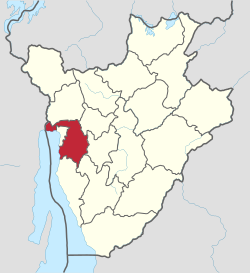
Burundi is divided into eighteen provinces, each named after their respective capital with the exception of Bujumbura Rural.

Bubanza is one of the 18 provinces of Burundi.

Bujumbura Mairie Province is one of the eighteen provinces of Burundi. It consists entirely of the city of Bujumbura, Burundi's former capital.

Bururi Province is one of the eighteen provinces of Burundi. It was formerly Burundi's largest province until the communes of Burambi, Buyengero and Rumonge were transferred to the province of Rumonge when it was created in 2015.
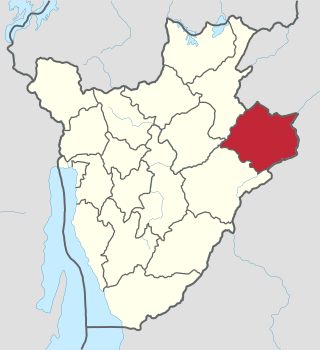
Cankuzo Province is one of the 18 provinces of Burundi. Located in the eastern part of the country, the province covers an area of 1,965 km2. The provincial capital is Cankuzo. It is Burundi's least populated province.
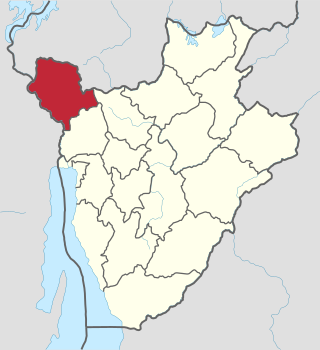
Cibitoke Province is one of the 18 provinces of Republic of Burundi.

Gitega, formerly Kitega, is the political capital of Burundi. Located in the centre of the country, in the Burundian central plateau roughly 62 kilometres (39 mi) east of Bujumbura, the largest city and former political capital, Gitega is also the second largest city and former royal capital of the Kingdom of Burundi until its abolition in 1966. In late December 2018, Burundian president Pierre Nkurunziza announced that he would follow on a 2007 promise to return Gitega its former political capital status, with Bujumbura remaining as economic capital and centre of commerce. A vote in the Parliament of Burundi made the change official on 16 January 2019, with all branches of government expected to move in over three years.
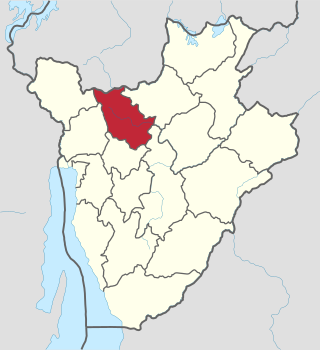
Kayanza Province is one of the 18 provinces of Burundi. Its capital city is also called Kayanza centre.
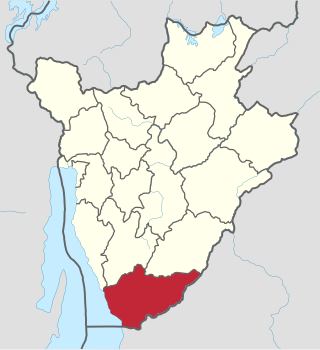
Makamba Province is the southernmost province of Burundi. The province has a population of 430,899 and covers an area of 1,960 km2. The provincial capital is Makamba. Makamba has six communes, many refugees have returned from Tanzania to this province, especially to the communes of Kayogoro, Nyanza lac, Mabanda and Vugizo. This causes a big problem, because there is not enough land for everybody. It is the most fertile province of Burundi.

Muramvya Province is one of the 18 provinces of Burundi. The capital city is Muramvya. In 2007 the province was added to the UNESCO World Heritage Tentative List.

Muyinga Province is one of the 18 provinces of Burundi.
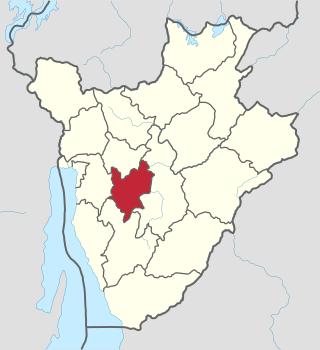
Mwaro Province is one of the 19 provinces of Burundi. Its capital is Mwaro.

Ngozi Province is one of the 18 provinces of Burundi.

Ruyigi Province is one of the 18 provinces of Burundi.

Gitega is one of the 18 provinces of Burundi. Its capital is Gitega, which is also the national capital. It has a population of 725,223 as of 2008 and an area of 1,979 square kilometres (764 sq mi).
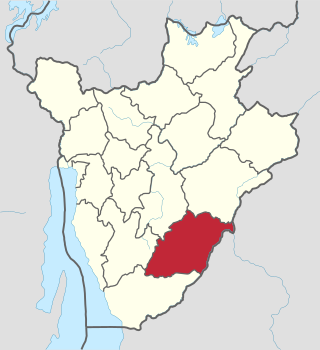
Rutana Province is one of the 18 provinces of Burundi.

Burundi is a unitary state which is sub-divided at three levels: provinces, communes, and collines (hills).

Rumonge Province is one of the eighteen provinces of Burundi. It was created on 26 March 2015 by combining the communes of Burambi, Buyengero and Rumonge, previously part of Bururi Province, with the Bugarama and Muhuta communes previously belonging to Bujumbura Rural Province.

The Natural regions of Burundi are geographical subdivisions of Burundi that date to colonial times. They can be broadly grouped into the Plain zone in the west beside Lake Tanganyika and the East African Rift valley, the Congo-Nile ridge, the Central Plateaus and the Depressions to the north, east and south of the plateaus.

The Mugamba natural region is a natural region of Burundi. It extends along the ridge that divides the Congo watershed from the Nile watershed, and contains the highest peaks in the country.
